Crackdown retrospective
The man in the high castle.
There's nothing much to do at the top of the Agency Tower. Trust me: I've been there before.
I'm there right now, actually. As I type this, my Xbox 360 is humming to itself over by the TV. I look up and rosy dawn is breaking above Pacific City. Red lights are blinking in the distance, the rising sun hits the water broadly, giving it a likeness of chrome, and my Kevlar supercop, knackered by the climb no doubt, is standing, feet apart, taking in the sights.
And by the standards of most video games, the sights would seem to be, well, a bit underwhelming. No dragons are flying overhead. No star destroyers are being pulled down out of the cosmos. No one's stuck to cover, no one's titting about with a bow, no one's earning bonus XP. Yet this is still one of the best sights in modern video games - it feels like the lofty vantage point from which I've seen a whole generation unfold. Like Crackdown itself, the view's not beautiful because of all the things I can see. It's beautiful because of all the things I can't see. All the things I can't see because they simply aren't there.
Less is more. That's all you have to know about Crackdown, really, although there is plenty of other stuff to talk about. There are the agility orbs, of course, a treasure hunt so haphazardly perfect that hundreds of other games would try to recapture the magic without success while that thrilling, almost opioid ping! they gave to gaming has broken free of the 360 itself and now heralds the arrival of a million text messages every day. There are the judicious thefts from Zelda: the trigger-targeting that allows you to approach each scrum of enemies with a deadly kind of off-the-cuff precision - or shoot the petrol cap from a speeding sportscar without having to consciously process the thought first.
If you want to bust out the history books, there's a pleasing mirror effect at work, as well. This is the other Grand Theft Auto 4, if you like. It's from the same lineage as the first ever GTA - a game primarily inspired by pinball rather than Scorsese or Michael Mann, incidentally - and you can view it as the path the Housers chose not to take. No cousin on the mobile. No cousin at all - and no mobile either. No characters, really, although you occasionally have to dismiss a blather of dossier facts as you approach a boss. No story, beyond the absolute minimum required for a nasty little sting in the tail.
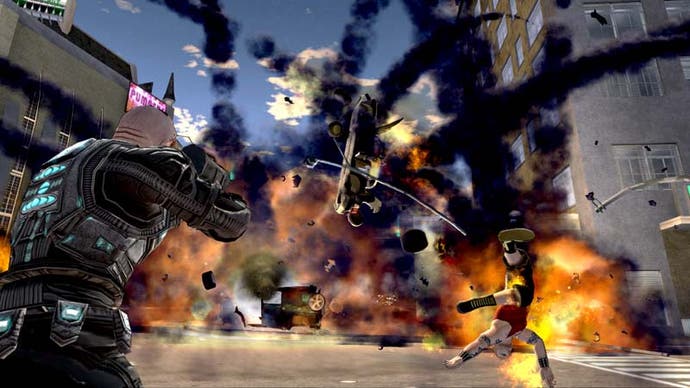
And we're back to that idea of negatives again - the road not travelled, the things that were left on the cutting room floor. Seen this way, Crackdown's appeal really isn't complicated: it's fun because it's about the absence of things that other games mistake for fun. It's a game about platforming and a game about power, and it's not really a game about very much else. Sweet glory!
That's not to say it's empty. Realtime Worlds, the developer, just has its priorities straight. So many other games this generation have approached systems, compulsions, metagames like they're building elaborate gantries around the flimsiest of rocket ships. Crackdown ignores the gantry altogether and focuses on strapping really huge, ugly thrusters onto that rocket before blasting you straight into orbit - and somehow the whole thing survives the launch.
It's a very NASA engineering approach to design, actually: a game that feels shaped by a series of this-or-that? decisions, a game that had to account for every bit of its payload budget, that knew it couldn't have both A and B. The trappings of Pacific City are horrible and cheap, for example: roughly hewn geometry, ugly textures, and a thick black cartoon line to hide how basic everything is. The reason for this, though, is that it allows for a peerless draw distance: you can see across the entire urban sprawl from almost any position on any street if you can get yourself high enough into the air. Realtime worlds indeed: you can plot an impromptu course. You can scheme in three dimensions.
Equally, the narrative is quick to dismiss itself, to get out of the way so your own personal adventure can unfold. "It's all gone to shit and it just keeps rising," says the opening cut-scene. "Now it's about to hit the fan." Nobody tortured themselves over that paragraph for very long, and why should they? It's become a cliche - or at least a truism - to say that the best stories in games are the stories that players tell themselves. Crackdown is where this sentiment finds one of its clearest expressions.
Then there's your objective: a non-linear muddle of bosses instead of a complex, structured campaign. Kill each island's generals, and finally kill its kingpin. Or, hell, kill its kingpin first if you can take it. Venture out in any direction and you'll find someone big and bad who needs a shoeing. Why should it be any more complex? Why do you need buddy characters or co-stars when you've got a homing rocket launcher and the power to leap buildings - and when you've got that voice in your ear?
That voice! Earlier on I said that Crackdown was lacking in any kind of characterisations, but there is one person whose spirit seems to help define the game: the director of the Agency, which is the fairly sinister group of law-enforcers you work for. The director's a narrator who comments on your activities, tells you off when you're doing the wrong kinds of killing, and sometimes rambles on a little for no good reason at all, like an elderly uncle whose memory is starting to unravel. He strikes the faux-chummy, slightly disturbing sort of avuncular attitude you often got from US newscasters in the 50s and 60s. I can imagine him turning up at a family barbecue in the golden light of an old Super-8 movie wearing horn-rims and a knitted shirt. His hair is slicked back. His eyebrows are permanently arched. He looks like an evil Bob Hope.
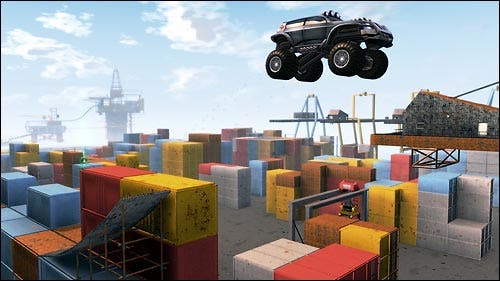
However you picture him yourself, he's a better commentary on the bland complicity video game campaigns provoke than anything in Rapture. Stand back occasionally and you see yourself, and glimpse that surprisingly sharp splinter of satire at the heart of the whole thing. You're a faceless stormtrooper - a Nazi who's just really, really good at jumping - defeating a selection of stereotypes: Latin American gangs, Russian thugs, asian technocrats. You're the good guy, right, so why do you feel so bad? And why are the peace keepers ultimately just another gang to be toyed with?
Whatever point it's making, Crackdown allows you to set your own course and stoke the fires of progression wherever it is you wander. It allows for glorious moments of comedy, too, such as one fine day down on the beach where I jumped off a ramp in my SUV, flipped through the air, caught a brief warning video that a general was nearby, and then landed on him, killing him instantly. That's how I remember it unfolding, anyway, and the memory's all that really matters with Crackdown.
And those memories always converge around the same handful of elements: around landscape and around tools. Like the move set, there's a blunt brilliance to the trio of vehicles you're offered, for example: two strains of Batmobile and a truck. They level up as you do. And again, look at the brutal, energising removal of frills. Why bother with skill trees in a world where all you can do is jump, kick, shoot, drive, and blow things up? Why not just focus on allowing players to get steadily better at those five crucial elements? Why not make the simple pieces sing?
They really sing. I've spent almost as long jumping around in Crackdown as I have in Mario, I think: I've spent tens of hours leaping over the chunky ground, grasping ledges and wheeling my arms and legs about. Pacific City's that rarest of video game worlds: comprehensive yet ownable. Find the right vantage point, and you can see it all. All three islands: mountains, coast roads, a fun park, mega-towers. Each one of those islands has singular districts and neighborhoods you can settle into for an hour's mindless havoc. Volk's central plaza, Shai-Gen's bizarro research labs, the area I always think of as Tetris Docks because of the stacks of brightly-coloured crates.
The story's stereotyping can't undo the pleasure brought from sheer geometry, either. Descending on a specific clutch of streets here is a little like spinning Google Earth on its axis and then zooming in close. You mean to look at just one thing, perhaps: the road where something memorable once happened, a particularly odd building. Thirty minutes later, you're still poking around, however, lost in the connections that keep suggesting themselves.
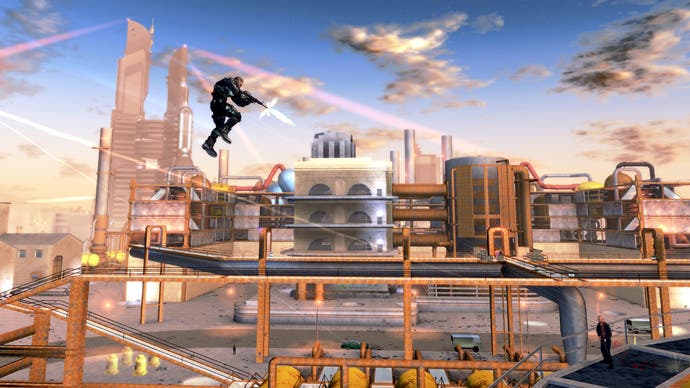
I've been everywhere. Everywhere. Why did I do all this? Those orbs played a part, of course - green bundles of joy that are scattered around, ripe for a night's hunting - but is that honestly the real answer? We're back to the negatives, the audacious edits. In part, I jumped around the landscape so much because of the things that simply weren't in the way to stop me. There was nothing to bar me from scaling buildings and, let's be honest, not that much to keep me down at street level. You get up to the rooftops in Crackdown because you can, and then you stay there because you start to wonder why every other open world game doesn't let you do this too. You plan journeys for no reason. You hop from one island to the next because hopping around is fun, particularly when you land with a concrete splintering slam to the street, a kind of human full-stop. You can cause carnage with friends or carnage with strangers, you can reset the gangs on a daily basis just to make your hopping a little more dangerous.
Or you can ignore all of that and retreat to the Agency Tower: a building with no enemies, no openly stated objectives. It's a building with no reason to be except that it's a handy central position to launch you into the action, and yet it ultimately dominates the entire Crackdown experience. This is the true boss of a game that's filled with bosses, a neat spatial puzzle that takes five or ten minutes to scale. Up we go once more, over the jagged scramble of rocks, past the ring of lower buildings and then higher, as we pick one of three art deco skyscraper spikes, each topped with a roving red light.
So what are we doing up here again? There's a further scattering of orbs and an Achievement or two - and Crackdown's one of those special games that really makes Achievements work - but that can't account for how many times we've returned after all that stuff was claimed - after every orb and every Achievement in the whole game was claimed, too.
Simply put, we've returned because nowhere in Crackdown's world is the game's beauty more obvious than it is here. I'm too happy, too often, to be lead through a game by the nose - only seeing the bits I'm meant to see and doing the things I'm meant to do. Crackdown's beauty is that it realises all of this. It knows that players find rules and the structure that rules impose singularly powerful - so by removing some of those rules, you'll start to free them. You'll start to free them from themselves.
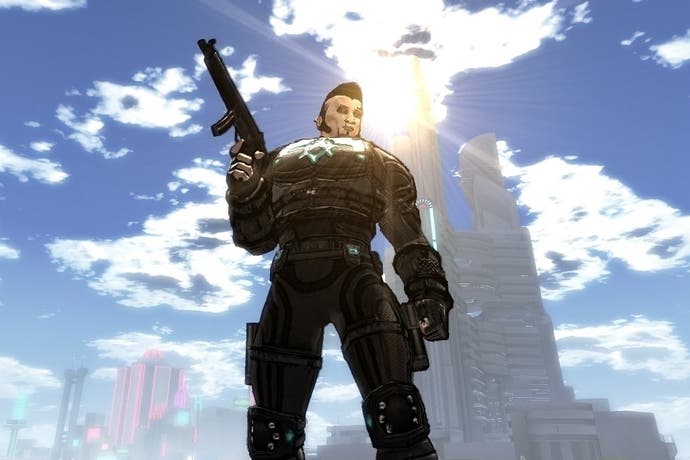

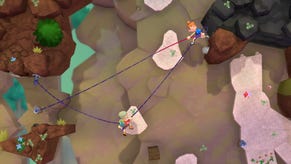
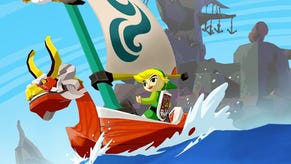
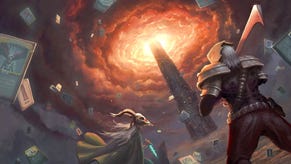

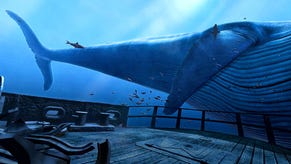
.jpg?width=291&height=164&fit=crop&quality=80&format=jpg&auto=webp)
